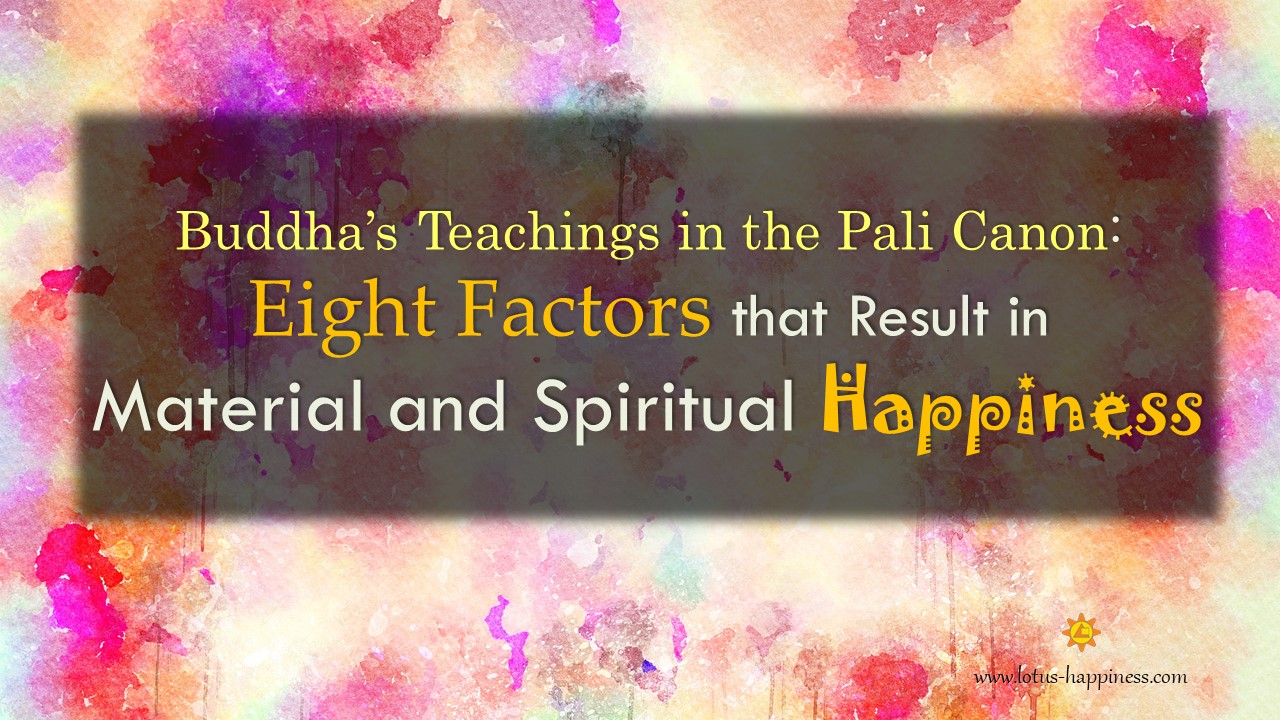Buddha’s Teachings in the Pali Canon: Eight Factors that Result in Material and Spiritual Happiness
Shakyamuni Buddha’s teachings documented in the Pali Canon are exceptionally practical and relevant for lay Buddhist practitioners to lead rewarding and fulfilling lives.
In AN 8.54 Dighajanu Sutta: Conditions of Welfare, a wealthy lay Buddhist called Vyagghapajja sought the Buddha’s advice on how to have weal and happiness as a lay Buddhist practitioner in this and future lifetimes.
The Buddha then taught him the Eight Factors that will result in material and spiritual happiness. There for four factors that result in material happiness and four factors that result in spiritual happiness.
So, what are the Eight Factors? Let us learn directly from AN 8.54 Dighajanu Sutta: Conditions of Welfare itself:
Four Factors that Result in Material Happiness
Factor #1: Persistent Effort
“Herein, Vyagghapajja, by whatsoever activity a householder earns his living, whether by farming, by trading, by rearing cattle, by archery, by service under the king, or by any other kind of craft — at that he becomes skillful and is not lazy. He is endowed with the power of discernment as to the proper ways and means; he is able to carry out and allocate (duties). This is called the accomplishment of persistent effort.
Factor #2: Watchfulness
“Herein, Vyagghapajja, whatsoever wealth a householder is in possession of, obtained by dint of effort, collected by strength of arm, by the sweat of his brow, justly acquired by right means — such he husbands well by guarding and watching so that kings would not seize it, thieves would not steal it, fire would not burn it, water would not carry it away, nor ill-disposed heirs remove it. This is the accomplishment of watchfulness.
Factor #3: Good Friendship
“Herein, Vyagghapajja, in whatsoever village or market town a householder dwells, he associates, converses, engages in discussions with householders or householders’ sons, whether young and highly cultured or old and highly cultured, full of faith (saddha), full of virtue (sila), full of charity (caga), full of wisdom (pañña). He acts in accordance with the faith of the faithful, with the virtue of the virtuous, with the charity of the charitable, with the wisdom of the wise. This is called good friendship.
Factor #4: Balanced Livelihood
“Herein, Vyagghapajja, a householder knowing his income and expenses leads a balanced life, neither extravagant nor miserly, knowing that thus his income will stand in excess of his expenses, but not his expenses in excess of his income.
“Just as the goldsmith, or an apprentice of his, knows, on holding up a balance, that by so much it has dipped down, by so much it has tilted up; even so a householder, knowing his income and expenses leads a balanced life, neither extravagant nor miserly, knowing that thus his income will stand in excess of his expenses, but not his expenses in excess of his income.
Four Factors that Result in Spiritual Happiness
Factor #5: Faith
“Herein a householder is possessed of faith, he believes in the Enlightenment of the Perfect One (Tathagata): Thus, indeed, is that Blessed One: he is the pure one, fully enlightened, endowed with knowledge and conduct, well-gone, the knower of worlds, the incomparable leader of men to be tamed, the teacher of gods and men, all-knowing and blessed. This is called the accomplishment of faith.
Factor #6: Virtue
“Herein a householder abstains from killing, stealing, sexual misconduct, lying, and from intoxicants that cause infatuation and heedlessness. This is called the accomplishment of virtue.
Factor #7: Charity
“Herein a householder dwells at home with heart free from the stain of avarice, devoted to charity, open-handed, delighting in generosity, attending to the needy, delighting in the distribution of alms. This is called the accomplishment of charity.
Factor #8: Wisdom
“Herein a householder is wise: he is endowed with wisdom that understands the arising and cessation (of the five aggregates of existence); he is possessed of the noble penetrating insight that leads to the destruction of suffering. This is called the accomplishment of wisdom.












